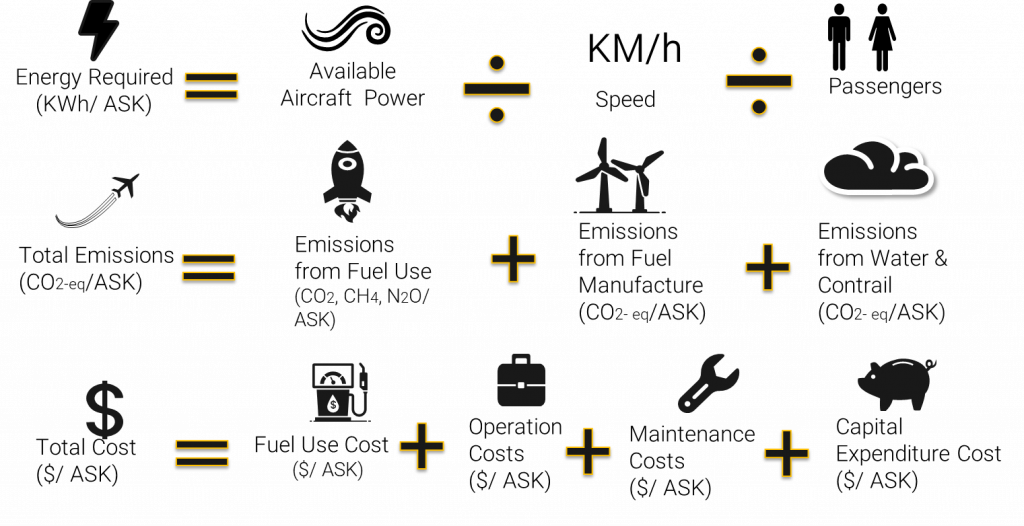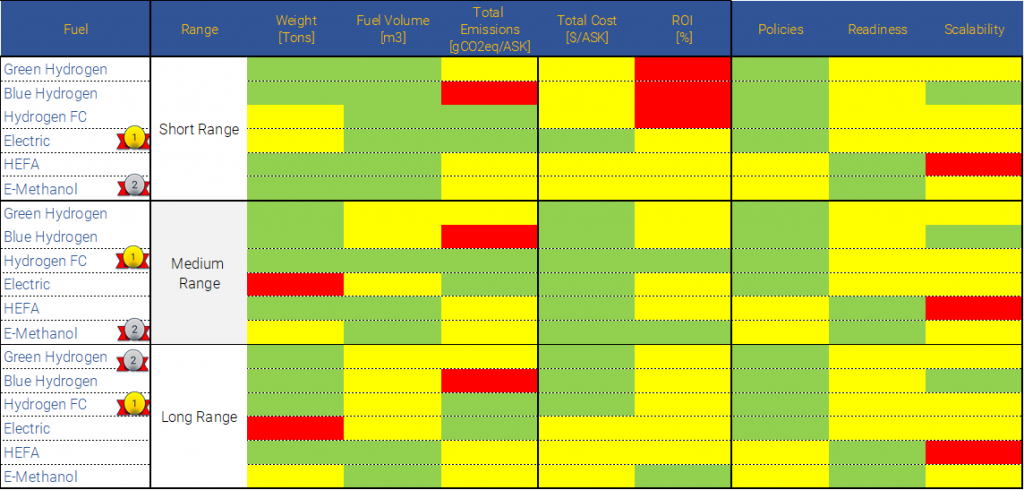Manuel Estandia Zeevaert | MEL Candidate | Dec 17, 2021.
Mentors: Claire Cameron and Moe Kabbara, Dunsky Energy Consulting;
Abstract
In December 2020 Government of Canada supported by Natural Resources Canada (NRCan), released the Hydrogen Strategy Plan. Creating a framework of opportunities to develop hydrogen economy. Even though aviation has small percentage of total Canadian emissions 8.8 Mton CO2-eq in 2019, it accounts as one of the highest factors per capita for people that fly. Canada takes the 4TH place in domestic flights CO2-eq with 168 kgCO2-eq /person, and 10th place in international flights.
Long and medium range aviation have been preliminary reviewed as an option for hydrogen in flights, and electric planes using lithium batteries are now considered a good option for electric planes. Recently the sustainable aviation case has attracted public attention, and because of its complexity, important stakeholders are looking for viable options to achieve Net Zero by 2050.
The study compares 3 criteria’s, environmental impact, energy use and costs. The comparison asses the most capable options according to literature reviews. Electric propulsion, SAFs, Fuel cells and Hydrogen Turbines, will be compared with the base case in a similar range and cargo capacity scenario. The environmental impact would be assessed by a high level LCA analysis based only in operative and production impacts of the fuels considering contrails estimated impact. Energy Consumption is compared by the efficient use of the energy starting from the primary energy in a per passenger-kilometer base. The financial study revises Opex, Capex, the Net-Present Value and Rate of return of investments normalized by available passenger per kilometer.
Introduction
Aviation accounts for 3.6% of Canadian Emissions from the transportation sector, yet it is projected to grow up to 19% in the Aviation industry continues in a Business-as-Usual Pathway,

IATA forecast a 19% of carbon offset and capture by 2050 to reach Net Zero goals, while new technologies are projected to be 13% of the solution. Hydrogen used as gas, in a Fuel cell or the form of synfuel can be an important technology if uncertainties are overcome

.
Methodology
The study conducted a comparison for the different feasible alternatives in energy use, emissions, and financial benefits in long (A380), Medium (A-321), and Short (A320) Range Flights.


Results and Discussion
Global Warming Potential:
Electric Propulsion systems have the least impact
Hydrogen Fuel Cells have 70% less environmental impact than BC
Hydrogen turbines, HEFA, and Synfuels are 56% less emitting than Kerosene concepts.
Only Electric and Fuel Cells can be considered True Zero Solution
Contrails account for ½ of the current CO2-eq impacts and few technologies can reduce them

Volume comparison shows a constraint for Hydrogen, Fuel Cells, and Electric propulsion systems a constraint, while there are options to increase volume up to 400% there is a tradeoff with passenger capacity and comfort
Weight Comparison makes Electric propulsion system unfeasible by 2035 with Lithium batteries energy density of 500 Wh/Kg

Financial Comparison
ROI While Returns of Investments are positive for all systems, there is a tradeoff of cost for all models, especially for short flights using Hydrogen and Fuel Cells
OPEX/CAPEX Hydrogen Plane concepts have a tradeoff of increased Operating cost due to having fewer passengers,
Capex is greater in Hydrogen and Fuel Cells concepts overall
Fuel Costs for Hydrogen are reduced and are projected to be less than Kerosene in 2035 with carbon taxes.

Electric Propulsion is the best option for short-range while having the least Global warming impact, it can be further reduced in a 100% renewable energy grid.
Hydrogen Fuel Cells can play an important role in medium and long-range flights by combining efficient propulsive systems with weight benefits of hydrogen
E-Methanol (synfuel) Can be a sustainable 2nd option for all ranges, having benefit from using the same infrastructure and propulsion systems
Hydrogen Combustion systems can solve long-range aviation by having benefited from the weight of fuel, but there are better alternatives for short and medium ranges
HEFA (Biofuel) Can be a good transition fuel until 2035 when other technologies develop, with more reliable feedstock and not compromising land use or food prices.

Conclusion
Hydrogen has prospective uses in Medium and Long-Range aviation. While in other to implement it by 2035, there are still barriers to overcome, and policies can help to develop these concepts. Phase Out high emission technologies
Value Recognition for H2 ( Carbon tariff, price premiums)
Support Kick starters
Contrail forming weather avoidance

References
1.Clean Sky. (2020). Hydrogen-powered aviation. A fact-based study of hydrogen technology, economics, and climate impact by 2050. Clean Sky2.
2.Roland Berger. (2020). Hydrogen. A fuel for Aviation? Roland Berger.
3.Clean Sky2. (2021). First Global Assessment 2020, Technical report. CleanSky2
Contact
Manuel Estandia Zeevaert
Email: mestandia@gmail.com
Phone: +1 604 715 7460
Website: www.linkedin.com/in/manuel-i-estandia